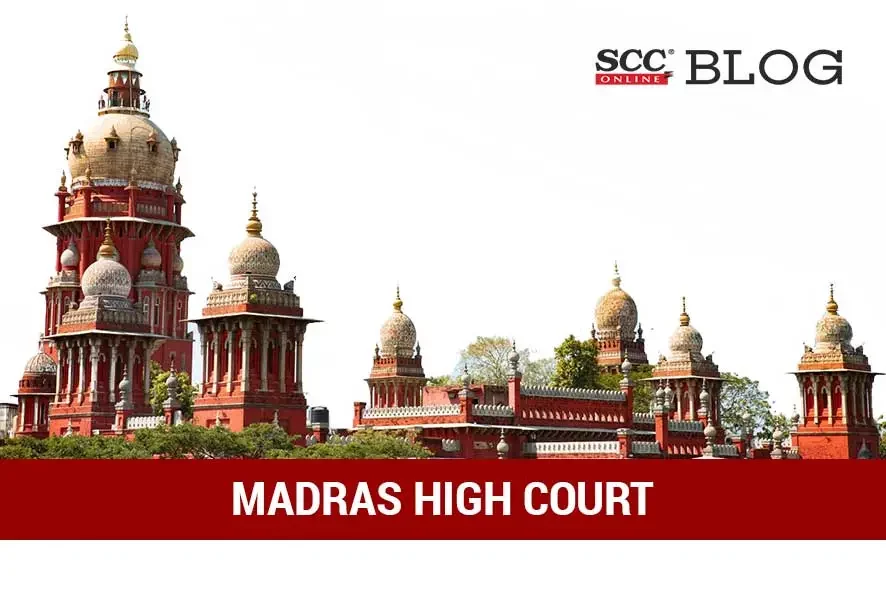Madras High Court: In a writ petition filed against the notification dated 17-07-2022 issued by the Government of Tamil Nadu Cooperation, Food and Consumer Protection Department, and to quash the same as illegal and consequently direct the Principal Secretary to obtain permission from the Supreme Court before issuing any such notification in the recruitment for the posts of Members and Presidents in the State and District Consumer Forums in the future, the division bench of R. Subramanian and L. Victoria Gowri held that the impugned notifications are bad in law, and thus quashed the same. Further, the subsequent selection procedure that has been undertaken was set aside.
Background:
The Central Government framed the Consumer Protection (Qualification for Appointment, Method of recruitment, Procedure of Appointment, Term of Office, Resignation and Removal of President and Member of the State Commission and District Commission) Rules, 2020. These Rules were published in the Central Government Gazette on 15-07-2020 and they were to come into force on and from 20-07-2020.
Some of these Rules, particularly Rule 3(2)(b), 4(2)(c) and 6(9) were challenged before the Nagpur Bench of Bombay High Court in Vijaykumar Bhima Dighe v. Union of India,1 wherein the Bench held that Rule 3(2)(b) and 4(2)(c) of the Rules, 2020 prescribing a minimum experience of not less than 20 years for appointment of President and Members of the State Commission and experience of not less than 15 years for appointment of President and Members of District Commission under the Act of 2019 is an attempt to circumvent the directions issued by the Supreme Court in the Madras Bar Assn. v. Union of India, (2021) 7 SCC 369 and State of U.P. v. All U.P. Consumer Protection Bar Assn., (2017) 1 SCC 444
Parallelly, the Supreme Court had initiated suo motu proceedings to monitor the actions taken by various State Governments to fill up the vacancies in the Consumer Fora all over the country in Various directions were issued by the Supreme Court in order to ensure that the State Governments fall in line in filling up the vacancies in the State and District Fora. Tamil Nadu took its own sweet time and issued the impugned notification was inviting applications from eligible candidates for appointment as Member in the District Consumer Redressal Commission in the State. Further, it was also inviting applications from eligible candidates for appointment as Member (Nonjudicial / earmarked for women candidate) in the State Consumer Disputes Redressal Commission.
The challenge is mainly on the ground that the impugned notification is based on the Rules framed by the Central Government in the year 2020 and are bad in law, in view of the fact that some of the Rules, particularly Rule 3(2)(b), 4(2)(c) and Rule 6(9) have been declared ultra vires the Constitution of India by the Bombay High Court. Thus, notification based on the non-existent rule is bad in law.
Issues:
-
What is the effect of the judgment of the Bombay High Court striking down some of the Rules as unconstitutional?
-
What is the effect of the directions issued by the Supreme Court in Re: inaction of the governments in appointing president and members/staff of Districts and State Consumer Disputes Redressal Commission and inadequate infrastructure across India2?
Analysis:
The Court noted that no notification was even issued by the State of Tamil Nadu as on 22-10-2021. The earliest notification calling for applications for the post of President and Members of the District Forum was made on 19-12-2021, i.e., after the order dated 22-10-2021. The impugned notifications have been made on 17-07-2022. Thus, the Court said that both these notifications were subsequent to the Nagpur Bench of Bombay High Court declaring Rule 3(2)(b), 4(2)(c) and 6(9) as unconstitutional. Therefore, legally and technically those Rules were not in the statute book on the date when the notifications calling for appointment were issued.
The Court said that the State had dragged its feet on the appointments, despite the fact that the Supreme Court was monitoring the action taken by the States in filling up the vacancies in the Consumer Fora. Further, the Supreme Court had not suspended the operation of the judgment of the Bombay High Court pending the Special Leave Petition.
The Court concluded that the Rules relating to experience such as, Rules 3(2)(b), 4(2)(c) and 6(9) were not in the statute book on the date when the impugned notifications were issued by the State. Therefore, the candidates who did not satisfy the required experience as per the Rules which were struck down were disabled or prevented from applying.
The Court reiterated that once a provision of the Central Law or a Rule is held to be unconstitutional by a High Court, the same would stand effaced from the statute book in respect of the entire Nation and it cannot be said that it would not be valid within the jurisdiction of the particular High Court and it would be valid in other areas. The Court held that the impugned notifications are bad in law, and thus quashed the same. Further, the subsequent selection procedure that has been undertaken was set aside.
The Court also directed the State Government to take appropriate action to make fresh appointments in accordance with the directions of the Supreme Court in Ministry of Consumer Affairs v. Mahindra Bhaskar Limaye, 2023 SCC OnLine SC 231
[V. Sundararaj v Registrar General, 2023 SCC OnLine Mad 3777, Decided on 08-06-2023]
Advocates who appeared in this case :
For Petitioner: Advocate G. Prabhu Rajadurai;
For Respondents: Advocate N. Mohideen Basha, Additional Advocate General Veera Kathiravan, Additional Government Pleader M. Sarangan, Central Government Standing Counsel V. Malaiyendran.
Buy Constitution of India HERE
1. WP.No.1096 of 2021.
2. Suo motu W.P.No.2 of 2021







